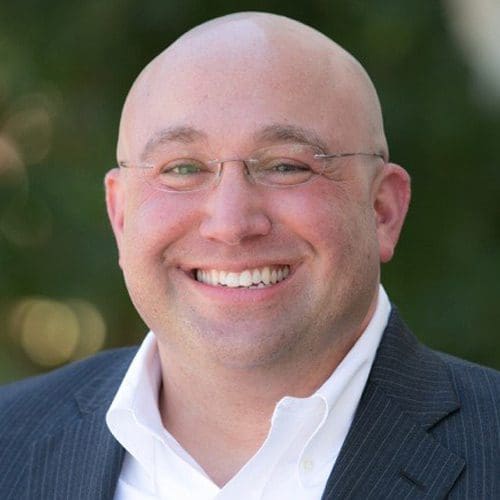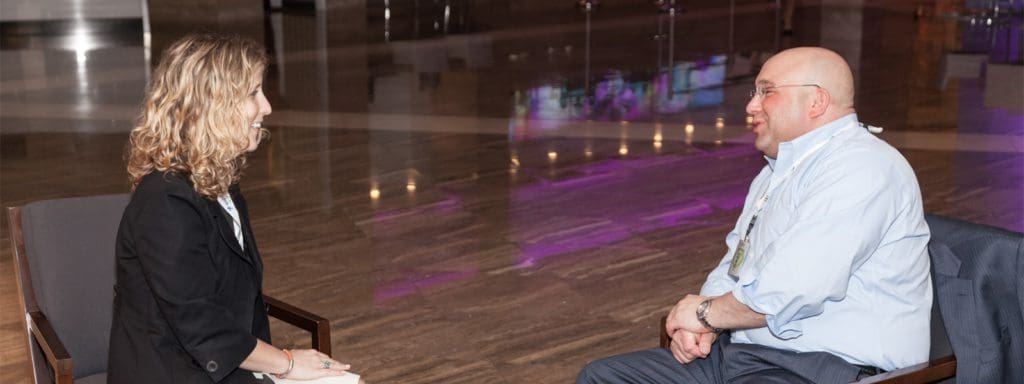15 Years of Hanging Out in the IS Conference Hallways

James Weinberg, CEO, FUSE
Hanging out in the hall may not win you brownie points in school, but for James Weinberg, CEO of FUSE Corps, the hallways of Independent Sector’s annual conference have been a goldmine for learning and forging great relationships. He’s been coming for 15 years, over the span of his work at four different organizations.
“No matter where I’ve worked or the position I’ve held, the relationships I’ve built at conference and within the community have turned into some of my closest friends and dearest colleagues,” Weinberg says.
“They’re the people whose opinions I respect when I need to check in about the direction I’m moving organizationally and strategically. I want to hear about their next steps and bold ideas so that I can be inspired to imagine new possibilities.”
“And more often than not, this is the one time per year we all get to see each other. We may not see each other all year. But we see each other at the Independent Sector conference.”
According to Weinberg, the conference is always a “pulse check on a national theme of discussion – whether it’s an election year, an economic crisis, a pandemic or war, or major trend in the nonprofit sector, whether a new cutting edge tool emerges, or there’s a need to discuss evaluation methods or cost impacts, the content from the sessions overflows into discussions in the hallway.”
Weinberg finds discussions during the conference important to helping him “understand the social sector’s perspective on what is happening in the world today, and how it impacts the work we do as a group of organizations that represent ten percent of the U.S. labor force.” He sees the annual conference as “the one sort of place where we can gather as a group and try to understand the ways in which the world is developing, how we can catalyze on those opportunities to better serve our communities, and how we can address and guard against obstacles and challenges so that we continue to serve our missions.”
“Excited to use Detroit as thought-provoking framework”
Ask Weinberg about his favorite location for an Independent Sector conference, and his answer might sound evasive, especially because his organization works in more than a dozen cities around the country.
He thinks it’s great that the conference moves around the country, saying he’s been to cities he never would have visited otherwise. He’s also impressed by how the conference works in partnership with the local host committee, and provides opportunities to showcase local initiatives, go on site visits of local programs, eat at local establishments, and see communities’ significant landmarks.
“I’ve had a chance to experience cities and to meet people and forge partnerships that – more than a decade later – would inform some significant piece of work that I was doing. “
He’s also glad that the conference “doesn’t just move back and forth between the east coast and the west coast,” citing years when it “put us in communities at times when there is a really significant discussion specific to that community.”
“Over the last year, we have seen a series of socioeconomic issues at play throughout many communities in the country, but cities like Detroit are representative of so many of those factors. I’m looking forward to using Detroit’s example as a thought-provoking framework and backdrop for these discussions to reflect on what’s been happening in Michigan and across the nation over the years, where we are today, and where we are heading. There are a lot of important lessons there for those of us who are working in communities around the country, so it’s a good year to be in Michigan and discuss these dynamics.”
Embracing “Upcoming, Next Generation Leaders”
With 15 years of attendance under his belt, Weinberg may be a veteran of the former IS conference, but he has a special regard for new recruits in the social sector.
Weinberg says the conference has done a “really good job” over the years of adapting programming to embrace upcoming, next-generation leaders. “As one of the early members working to help create the NGen program, I think IS has been a leader in the field of social sector talent development.”
“There are generational dynamics at work that will lead to a tremendous need for leadership in the coming years in our sector. We’ve all known that for many years, and it’s out in front of us to address. We know that technology, globalization and a lot of other macro-level factors are changing the very nature of work in this field incredibly rapidly, and we need new ideas and new thinking about how to work more efficiently and effectively in service to our missions.” He’d like to see more conference sessions on “succession planning, management techniques, leadership development, work/life balance, and competitive compensation.” He continued, “I think all of that can create a healthier workforce and more successful, human-centered organizations.”
Continuing a Conference Tradition of Leaning Forward
After 15 years of attending the Independent Sector conference, Weinberg says one of the things he appreciates most is the effort to “deconstruct the traditional conference session, to make more sessions interactive, and bring more voices and a diversity of perspectives to the table,” noting ongoing efforts to provide various structures that go beyond plenaries. “The conference has felt most dynamic and engaging when the program included content and alternative modalities of discussion that have gotten everyone in the room engaged and talking.”
He feels strongly that one of the conference’s most important roles continues to be serving as a vital meeting ground where attendees can consider the tough issues of today. “Some days it feels as though we are living in a time of tremendous conflict, insecurity, uncertainty, fear, and even hate. And the role of the U.S. in the world, as well as the federal government’s role within this country, is changing rapidly.”
“It has called into question some of the fundamentals of what work the social sector takes on and the way we do our work. I hope the conference will continue its tradition of leaning forward into those conversations and tough self-analysis of whether we’re doing the work we should be doing, and whether we’re doing it in the most inclusive and effective way. These questions need to be asked and answered, now more than ever before.”
Noting IS’ collaboration with the Council of Michigan Foundations and the Michigan Nonprofit Association to produce Our Common Future, Weinberg says, “There are not enough forums for social sector leaders to come together and grapple with these issues. The conference is one of too few places where those conversations occur, and they’re incredibly important when you consider the vital role that sector organizations play in every community from coast to coast throughout this nation.”
Look for James in the hallways of Our Common Future. Even though it’s no longer the Independent Sector Conference, we’ll give him credit for 16 years of attendance. If you know of another long-running attendee who can match James’ record, please let us know!
James Weinberg is CEO of FUSE Corps a nonprofit that helps local government more effectively address urban communities’ biggest challenges. FUSE partners with civic leaders to identify pressing strategic challenges, then recruits entrepreneurial professionals to serve in executive-level fellowships across local government. These FUSE Fellows use their unique skillsets to help achieve transformational impact across issue areas such as education, health, poverty, public safety, infrastructure, economic development, and the environment.



